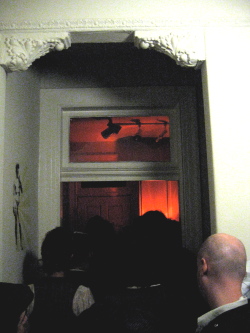The Hipster Rite of Passage: organizing your very own Kitchen Show Party
You've surely seen them around, hipsters, with their layered slacker jeans, thick slabs of irony, and fixed gear bikes. Here, in the heart of the Mission District of San Francisco, they're thick as flies.
Hipsters are individuals. You know this because they express their individuality with $1000+ tattoos on their bodies for everybody to see (and in private places for those of more intimate acquaintances). According to Jean Twenge, this arch (and rather mild) form of narcissism has its origin in the self-esteem revolution of education that occurred in the mid-1980's, precisely when the current crop of hipsters were younguns.
Despite their rugged individuality, hipsters behave like every other form of human collective, forming their own subculture. They define themselves with markers of the in-group, they have rituals and they undergo rites of passage.
What then, is the hipster rite-of-passage? It is surely the kitchen-show party. The kitchen-show party fulfills the requirement of a rite of passage – a communal gathering, a space for ecstatic expression, and a test of strength that defines the passage into hipster maturity.

The kitchen-show party is, after all, a communal event. You need a network of friends (or myspace friends – myfriends?). It is spread by word of mouth, so only the right people turn up. But then given the bands that play, only the right people would want to turn up.
In tune with the hipster aesthetic of making a virtue out of poverty, the kitchen-show party elevates the do-it-yourself aesthetic into a moral virtue. Cheap it is, but converting your domestic kitchen space into an art space, demonstrates architecturally that inside every hipster soul is the possibility of spiritual elevation. If the salon and the novel was the stuff of 17th century French literati, then surely, indie rock and the gig is the stuff of the 21st century San Franciscan bohemian.
The successful negotiation of the kitchen-show party is a trial of strength – to find a decent band, to attract a sizable crowd, and as a matter of practicality, to avoid being fined by the police (don't play after 10pm). Given San Francisco zoning laws, the party was so over by midnight.
Not any ordinary hipster can have a kitchen-show party – only the über-hipster can. She has to be in the know about up-and-coming bands. She has to know enough fellow hipsters to create sufficient buzz. But she has also to be known to have the requisite taste. It is the defining characteristic of the hipster to master the archipelago of local music.

Of course, the band plays in the kitchen for free. Music that has authenticity is by nature, not marketed for broad consumption. A life of poverty for the hipster musician is the price of the hipster's seal of approval.
The look of the crowd that showed up slotted perfectly into the hipster aesthetic, the result of months (maybe years) of careful thrift-shopping and innovative mix-and-matching. Individual items were put together by thoughtful deliberation, not by design. Layers were in. Boots and chains were in. Retro was definitely in. This is the aesthetic of poverty, and why wouldn't it be, given that most of those attending were up to their eyeballs in student loans?

Like any human ritual, there was mass movement of human body at the kitchen-show, there was dance. But of course the style of dancing has a hipster twist. The typical movement consisted of a slight swaying of the body, ostensibly from waist up, and the head rocking gently back and forth, as if the crowd was collectively agreeing to the questions posed by the music. It's a low energy, highly cerebral form of movement. Perfect for a class of overeducated liberal-arts college graduates.

Many weeks later, after a number of kitchen parties, my roommate recounted me a story. She was at this other (paid) show with a veteran local band. After the show, the guitarist of said band came up to her and asked if she was the "kitchen-show girl", and if she was, could they play there. Of course, she was flattered silly. But with a studied nonchalance, she replied, "but we can't pay anything, it's a free show." The fiero that flashed across er face, whilst telling the story, showed that she had, indeed, passed the trial of fire known as organizing her very first kitchen-show party.